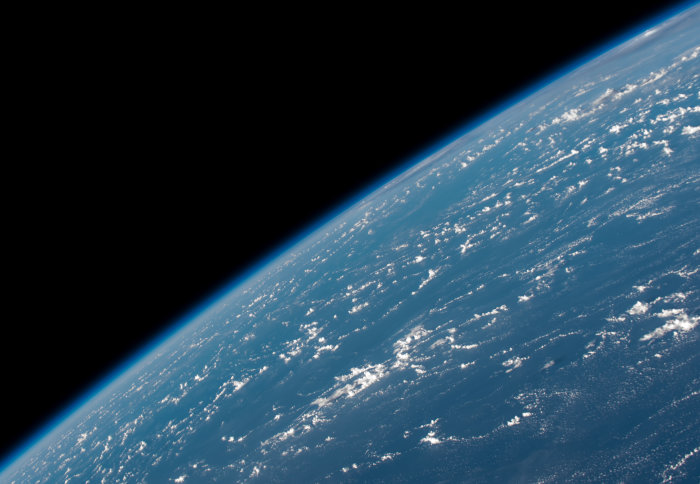New satellite looking at how Earth is losing its cool gets the go-ahead

Credit: ESA/NASA
A satellite that will measure Earth’s energy budget, helping to improve climate change predictions, has been selected as a future mission by ESA.
FORUM (Far-infrared Outgoing Radiation Understanding and Monitoring) will measure radiation emitted by Earth into space. This will provide new insight into the planet’s energy budget – how much energy it receives from the Sun, how much it retains, and how much it remits to space. This should fill in a critical missing piece of the climate jigsaw.
We anticipate that the highly accurate measurements that FORUM will deliver will enable us to reduce uncertainty in future climate change predictions. Dr Helen Brindley
The design of the mission will now be fine-tuned, and then the satellite will be built with a view to being launched in 2026 as the European Space Agency’s (ESA) ninth Earth Explorer mission.
Dr Helen Brindley, from the Department of Physics at Imperial College London, helped to lead the science advisory group for FORUM and secure its selection by ESA. She said: “We anticipate that the highly accurate measurements that FORUM will deliver will enable us to reduce uncertainty in future climate change predictions by providing observations against which we can test existing models.”
Dr Brindley is part of the National Centre for Earth Observation, a network of UK scientists funded by the Natural Environment Research Council.
Measuring the full spectrum
Different wavelengths of energy are affected by different parts of the Earth’s system. FORUM will measure long-wavelength outgoing energy, which is strongly influenced by water vapour and thin ice clouds in the Earth’s atmosphere.
Models predict that around 50 percent of the total energy emitted by the Earth is in this long-wavelength range, but it has so far not been monitored in detail from space.

FORUM's measurements will provide data on water vapour concentrations and the impact of ice cloud, particularly in the climatologically important upper troposphere and lower stratosphere regions of the atmosphere.
In drier, colder regions such as the Arctic, the measurements should also allow researchers to probe the role of long-wavelength surface emissions in determining the rate of change of surface warming – something that has been neglected up to now in most climate models.
FORUM will fly in loose formation with another instrument – IASI-NG – which measures shorter-wavelength energies, allowing the full outgoing spectrum of the Earth’s emitted energy to be measured for the very first time.
Improving climate change models
Better understanding the complexity of our climate system and filling gaps in our knowledge is of critical importance as the consequences of climate change are far-reaching. Dr Josef Aschbacher
Professor Wolfram Mauser, who chaired ESA’s Advisory Committee for Earth Observation on behalf of Martin Visbeck, said: “FORUM promises to improve climate models and, therefore, climate prediction. With the issue of climate change a major global concern, we finally decided to recommend this concept – and we are very happy that ESA has taken our recommendation.”
Measurements from the new mission will improve confidence in the accuracy of climate change assessments that form the basis for future policy decisions. Dr Josef Aschbacher, ESA’s Director of Earth Observation Programmes, said: “FORUM will bring great benefits to climate science. Better understanding the complexity of our climate system and filling gaps in our knowledge is of critical importance as the consequences of climate change are far-reaching, affecting all facets of society and the natural world.”
Beth Greenaway, Head of Earth Observation and Climate at the UK Space Agency, said: “Thanks to investment from the UK Space Agency, Britain could be a big player in this mission and I’m very proud that the ‘go ahead’ from ESA was based on fantastic science from colleagues at Imperial College London and the cross-European Mission Advisory Group supported by detailed technical mission feasibility from studies led by UK industry teams.”
Article supporters
Article text (excluding photos or graphics) © Imperial College London.
Photos and graphics subject to third party copyright used with permission or © Imperial College London.
Reporter
Hayley Dunning
Communications Division